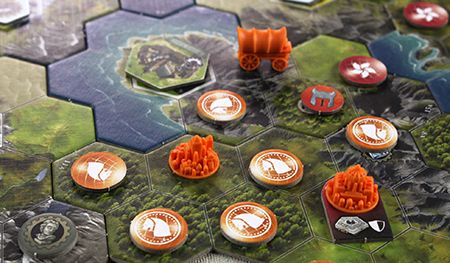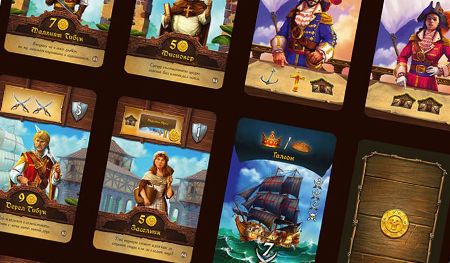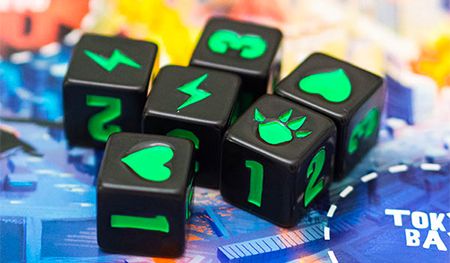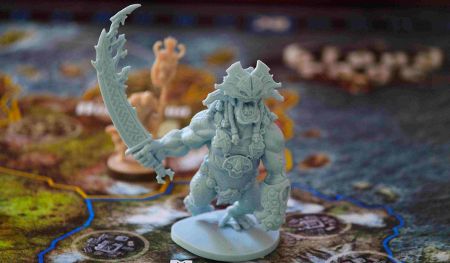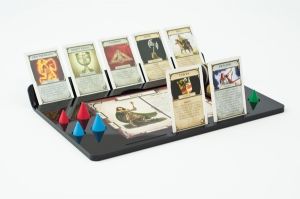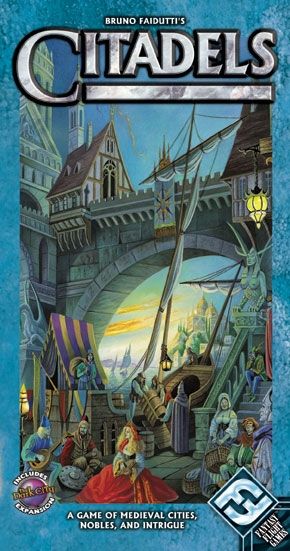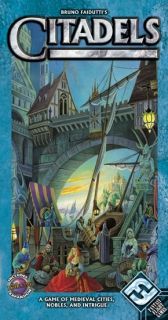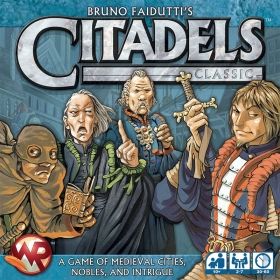A medieval city destined for greatness, immense power and importance beckons you. There is only one problem: it isn’t built yet. This vacuum presents the perfect opportunity for you. You must wisely spend your gold, bluff, intimidate and outmaneuver your rivals as you seek to build and control this new city.
Along the way you will enlist the help of the powerful figures of the city: the King, Bishop, Merchant, Warlord, and Architect. At the same time, you must remain on your guard against the Assassin, the Thief and the Magician... or you can use their shadowy influence against your opponents! Each round you must choose your allies and stay guarded against your enemies whoever they may be as they can change every round.
Citadels is a game of scheming nobles in a medieval city, racing for dominance. Players must carefully balance their choice of role and their flow of gold and districts to build the best city, fastest!
PLAYERS
Two to eight players can participate. In the four to eight player game, each player will select a single role each turn. In the two or three player game, each player will take two roles each turn.
THE ROLES
At the beginning of the game, the oldest player will take on the role of the King and take the Crown counter (don't worry, everyone should get a chance to be the King, as the role changes every round).
THE CROWN
At the beginning of each round, the role cards will be shuffled together and a number of them will be randomly removed from play - between one and three, depending on the number of players. In addition to the roles removed before players choose their characters, there will always be one role that will not be chosen.
With the roles randomly removed, the King takes the pile of role cards, chooses one for himself, and passes the rest to the player on his left, who chooses one and passes the rest on, and so on. Once every player has chosen a role, the remaining card is discarded face-down.
The random removal of roles from the character deck and the secret selection of the remaining roles adds an air of mystery to each round. While the King, the player who chooses his role first, has a significant advantage over the other players - he knows which roles have definitely been removed from the round - everyone has to guess or infer what roles the other players will take and what course they will pursue that round.
The various roles all have a variety of powerful effects on the game.
Killing someone for a turn is immensely strong - if you've chosen the right target. You won't know until the target fails to reveal himself, but if you're right, you've given yourself a real leg up. It is tempting to draw large church incomes and safeguard your
districts from the Warlord, but you can't win by hiding behind the Abbey walls forever. If you're ahead and you know you might be a target, the Bishop is a solid choice.
Robbing someone is a great way to get ahead and set someone else back, but if you choose incorrectly, you could end up with less than you'd expected. Watch the other players carefully. Often a target of the Thief, but if you can survive your enemies' attacks, you can stack up large piles of gold and build valuable districts quickly.
Choosing the Magician gives you very powerful abilities coupled with very unpredictable effects. If you know someone is holding valuable cards in their hand, pick the Magician to take them. You can use this role to end the game quickly by building very fast and by opening your options to many more cards, but the Architect is often a target of the Assassin and Magician.
Choosing this role gives you a very strong advantage in information and choice with the ability to choose your role first in the round, but is also vulnerable: everyone wants to wear the crown! The game is all about building districts and the power to destroy them can make or break a game. Sometimes it can be more useful to spend your gold destroying someone else's district that building one of your own.
THE TURNS
Beginning with the Assassin (character number one) and progressing in order to the Warlord (number eight), the King calls on each character to take his turn.
Once their role has been called, players may choose to gather an income of either cards or gold, activate their special character power, and may build one district card from their hand by spending its cost in gold.
After the Warlord is called, the character cards are returned to the King to be shuffled and a new round begins.
Because each round a player may have selected a different role, each turn will be different, and the successful player will have to be both forward-thinking and flexible in his strategy.
Since each role has a different special ability, each player's turn will be a pursuit of the best move for the role he has chosen, given a limited set of options and information.
For example: A player chooses the Thief and on his turn announces that he will rob the wealthy Merchant. He may look around the table at the piles of gold in front of the other players and intuit that the player with the largest pile and the most Trade districts in front of him must be the Merchant. But the Thief must take into consideration that the Merchant might not have even been one of the choices available, having been discarded by the King before roles were selected, or that he might have assumed wrong about which player secretly chose the Merchant. It could be that the player with the least gold chose the Merchant and the poor Thief would have to settle for petty spoils.
Careful observation and lucky intuition play a large role in Citadels, as does bluffing and risk-management.
A game of Citadels in progress
THE CITIES
As play progresses, each player will build a city composed of district cards. These cards all have a given value (which is also their cost) and a color - gold buildings represent nobility, green districts are related with commerce, blue districts are affiliated with the Church, and red buildings are part of the military.
Each of the colors of districts interact with characters such as the King, the Merchant, the Bishop, and the Warlord, so the makeup of your city can make choosing those characters on each round more or less attractive.
Finally, there are purple districts, each with their own special power.
Cities must be diverse to be successful! Focusing on a single color can yield impressive income benefits if you are able to select the right character, but that is still no guarantee if you are repeatedly assassinated or robbed by players who can successfully predict which character you will pick based on the makeup of your city. Moreover, there is a significant boost in score at the end of the game if you have all five colors represented in your city.
THE END OF THE GAME
When a player builds the eighth district card of his city, the end of the game is near. The game continues to the end of the round, and once the Warlord has completed his turn, the game is over. All players total up the value of the districts in their city and receive bonuses for being the first to build eight districts, having all five colors represented, and for achieving eight districts before the end of the game. The high-scoring player is the winner!
WHY CITADELS IS A GREAT FIT FOR YOUR GAMING GROUP
Citadels has a lot going on for it: the proverbial big bang in a small box. As a Silver Line game, Citadels is almost pocket-sized and can be carried along to any gaming event.
With its low game time (about fifteen minutes per player), Citadels is great as a fill-in game between other games, either at your weekly gaming group or between events at a convention, as well as being perfectly suited for lunch games.
As a relatively simple game, Citadels is easy to learn, and to teach, and can fit into a variety of gaming groups: your weekly get-together at your Friendly Local Game Store or at a family gathering.
What makes Citadels fun is trying balance making the best decision based on the roles available to you with figuring out what role everyone else at the table has chosen. It's a tough tightrope to walk! Given that the roles available in any given round are random, as well as the district cards you draw, each game is going to be different from the last, making the game very re-playable.
For a light card game with a surprising amount of depth, Citadels is a classic that can find its way into any game collection.
*text from the publisher's web site



